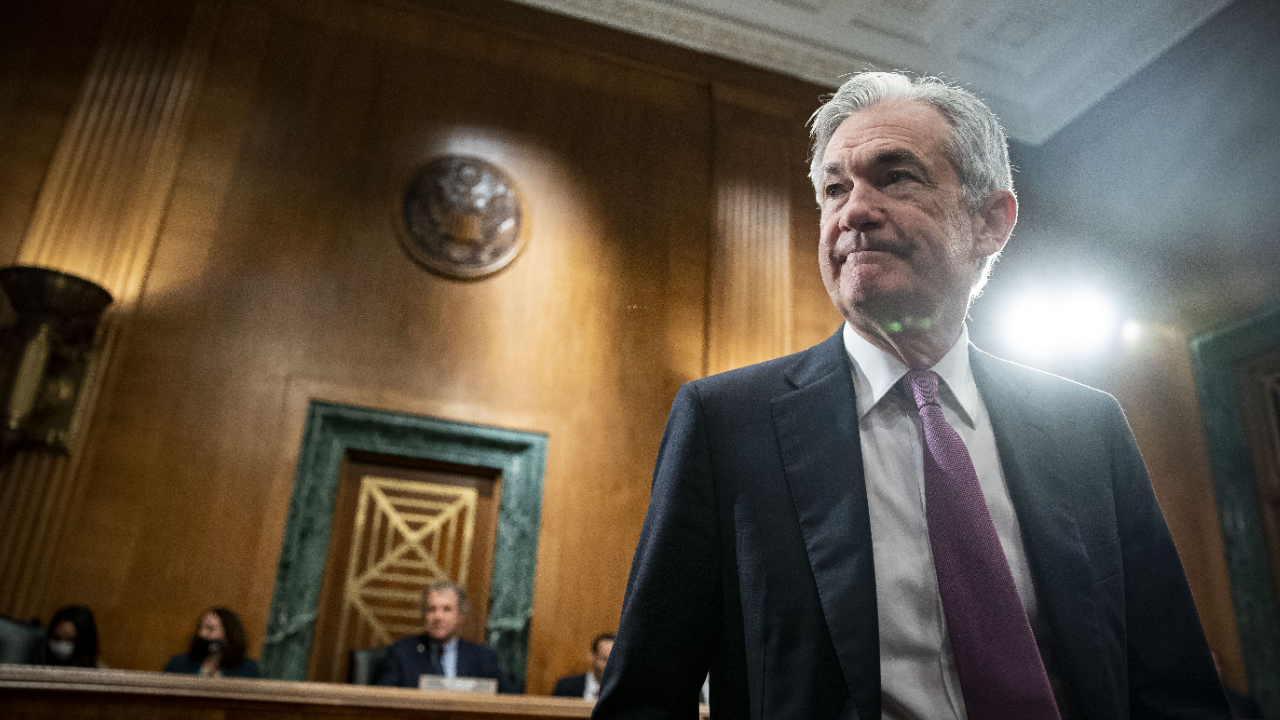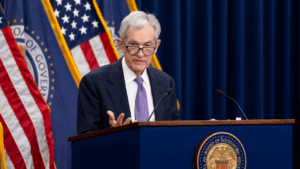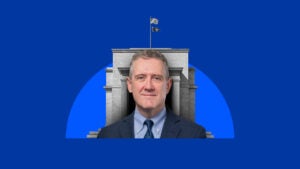Biden picks Jerome Powell for new term as Federal Reserve chair

President Joe Biden will renominate Jerome Powell to a second term as Federal Reserve chair, hoping for continuity in U.S. monetary policy as the economy bounces back from the pandemic.
The decision, which was widely expected to be Powell, is a victory for the Republican Fed chair whom President Donald Trump elevated from Fed governor in 2017.
Powell was later confirmed in 2018 with his term as the chief central banker initially set to expire in February 2022. He must now be approved by the Senate Banking Committee before facing confirmation in the Senate.
Biden also elevated Fed Governor Lael Brainard to be the Fed’s vice chair. A President Obama-era appointee, Brainard has been on the Fed’s Washington, D.C.-based board of governors since 2014 and long been cheered by Democrats for her stance on toughly regulating Wall Street’s biggest banks. Until Biden’s Monday announcement, Brainard had been seen as Powell’s biggest competitor for the top Fed job.
During Powell’s tenure as chief Fed official, Brainard’s been the lone Democrat on the Fed’s board and has spoken out about climate change’s threats to financial stability, as well as the importance of letting the economy run hot to help the labor market’s most disadvantaged workers.
“It’s tough to change jockeys in the middle of the race,” says Greg McBride, CFA, Bankrate chief financial analyst. “Reappointing Jerome Powell helps alleviate some concerns about politics compromising the independence of the Federal Reserve. By January, the president will still be able to name replacements for three open seats on the Fed Board of Governors, including the influential vice chair for supervision.”
Powell’s legacy: Leading a crisis-era Fed
Supporters see Powell as having guided the Fed toward an aggressive, all-hands-on-deck U.S. economic rescue during the devastating coronavirus outbreak, which cratered 22.3 million jobs and put the most Americans out of work since the Great Depression. Powell steered the Fed further and faster than it had ever gone before during a steep economic crisis, lending money to virtually all corners of the market.
Among the sweeping steps, the Fed slashed interest rates to zero at the onset of the pandemic and instituted a near unlimited bond-buying program to keep the system awash with credit. The Fed also created special lending programs that handed cash to state and local governments, municipalities, corporations and small businesses dotting Main Street.
“We can’t just return to where we were before the pandemic, we need to build our economy back better,” Biden said in a statement Monday. “If we want to continue to build on the economic success of this year, we need stability and independence at the Federal Reserve — and I have full confidence after their trial by fire over the last 20 months that Chair Powell and Dr. Brainard will provide the strong leadership our country needs.”
The renomination gives Powell a chance to finish what he started. Experts say the moves helped backstop the U.S. economy at a time of deep contraction, after the financial system shrank by a whopping annualized pace of 32.9 percent in the second three months of 2020. They also say his actions helped prevent the economy from enduring a simultaneous financial crisis.
“Inside the Federal Reserve, we understand that our decisions matter for American families and communities,” Powell said in a Monday statement beside Biden. “I strongly share that sense of mission, and I am committed to making those decisions with objectivity and integrity, based on the best available evidence, in the longstanding tradition of monetary policy independence.”
Economists and lawmakers alike rallied for a second Powell term, especially as policymakers have already begun backing away from those extraordinary pandemic-induced policies. The Fed in November announced that it would starting slow down how many bonds it’s buying each month by $15 billion each month until those purchases eventually hit zero — a process known as taper that could gradually lift mortgage and refinance rates, as well as interest rates on other longer-term debt.
Investors seemed to cheer the news of Powell’s reappointment, with the S&P 500 setting a new intraday record high. Biden’s bet on Fed continuity comes at a time when the labor market is still healing even as consumer prices soar at their fastest pace since the 1990s — cornering the Fed between its twin mandate of stable prices and maximum employment.
Powell’s nomination heads to the Senate for confirmation
Yet, the decision felt unusually up in the air for one of Biden’s top economic appointments, and members of Biden’s own party had been pushing for a fresh face at the U.S. central bank. Those calls grew louder after an ethics scandal emerged at the U.S. central bank involving two regional Fed bank presidents’ investment activities in 2020. Powell and Vice Chair Richard Clarida were eventually called into question as well, though they moved money around in broader, more diversified funds.
Seven of the Banking Committee’s 12 Republican officials have so far endorsed Powell for a second term in the top Fed job. Up until the ethics scandal, Powell has mostly captured bipartisan support from lawmakers at hearings, which experts say is linked in part to his time spent traversing the halls of the Capitol, meeting with lawmakers.
Yet, Powell has also taken heat from key progressive Democrats for steering the Fed toward rewriting 2008-era bank regulation rules, such as modifying stress tests for big banks. Sen. Elizabeth Warren, a Democrat from Massachusetts, who is on the banking committee, referred to Powell in a September hearing as a “dangerous man,” adding that his record gave her grave concerns.
Although they won’t have a say in confirming Powell, House Democrats Alexandria Ocasio-Cortez of New York and Ayanna Pressley of Massachusetts called on Biden in a joint August statement to Politico that Biden should reimagine the next head of the world’s most powerful central bank as a leader focused on climate change and economic equities.
Treasury Secretary Janet Yellen, who worked at the Fed with Powell before Trump replaced her, defended Powell’s deregulatory stance in an interview on CNN’s “State of the Union.”
“The core of our financial system did very well because of the improvements in capital liquidity, risk management, stress testing,” Yellen said. “And those improvements have stayed in place during the Powell regime.”
Sen. Sherrod Brown, a Democrat from Ohio who heads the Senate Banking Committee, didn’t indicate his position on giving Powell a second term, but referred to the Fed’s deregulatory moves as “giveaways to Wall Street” in an October letter to the chair. However, the top lawmaker said in November that he’s “certain” Powell will capture the votes needed for his reappointment.
Brown was one of 84 senators who voted to confirm Powell at his initial appointment back in 2018, with 13 voting against the appointment. Just four of those senators voting no were Republican, including Ted Cruz of Texas and Marco Rubio of Florida.
Yet, that party divide could be steepening. Sen. Rick Scott, a Republican from Florida, said in a Tuesday statement that he would not support Powell’s renomination because the chair “has done more to enable the reckless policies of the Biden administration than actually serve the best interests of the American people.”
Next Fed chair will have to tackle higher inflation, changing Fed mandate
Higher inflation poses a wrinkle for monetary policy and the goals that Biden might set out for his administration — as well as the next Fed chair.
Officials had warned of higher prices at the beginning of the year but claimed those pressures would subside once supply bottlenecks soothe and record demand balances back out as consumers come out of lockdowns.
Yet, supply chain troubles are nowhere near being solved, inflation hasn’t yet proven to be transitory, and prices are also picking up on rents, homes, gasoline and groceries. Consumer prices soared in October by the most since 1990, while another gauge shows the fastest pace since the 1990s.
Persistently high inflation might also challenge the Fed’s new mandate of prioritizing low unemployment — another one of Powell’s key accomplishments that experts say the Biden administration has likely cheered thanks to its implications for reducing economic inequalities.
Biden said on the campaign trail that he’d like the central bank to focus on limiting racial economic gaps and make rate decisions by factoring in the Black unemployment rate, which is typically twice as high as White joblessness. That’s in addition to calls from other members of Biden’s party who say the Fed and Powell should start addressing climate change issues given its implications for financial stability.
Powell doesn’t see the need to raise rates — for now
Officials haven’t changed their tune on inflation, and forecasts show that policymakers broadly expect price pressures to settle down in 2022 and 2023. Yet, central bankers are now starting to debate whether to hike rates as soon as next year.
Powell said in an October appearance that he doesn’t see the need to raise rates right now. Yet, the move up in the rate-hike timeline suggests officials could be worried about inflation, considering that they initially gave off the impression earlier this year that they’d keep their benchmark borrowing rate at rock-bottom through 2023. Just one official in September saw rates holding at zero for the next two years, a remarkable shift.
Officials have said the sooner they finish purchasing assets, the sooner they’ll be able to start raising rates. The challenge for Powell moving forward will be steering the Fed toward consensus at a time when the recovery is looking like none other before.
About 4.2 million jobs are still missing from the labor market, and the labor force is roughly 3 million people short of pre-pandemic levels. Yet, employers say they’re struggling to hire qualified workers, with employers in September showing a near-record 10.4 million open positions.
“I do think it’s time to taper, and I don’t think it’s time to raise rates,” Powell said at a virtual Bank for International Settlements-South African Reserve Bank conference. “It would be premature to do so at a time when we are far below the level of jobs we had in 2020.”
Learn more:
- Worried about surging inflation? Here’s 3 ways to protect your wallet from taking a big hit
- Will the Fed raise interest rates soon? Here’s what experts are saying
- 5 ways the Fed’s interest rate decisions impact you
Why we ask for feedback Your feedback helps us improve our content and services. It takes less than a minute to complete.
Your responses are anonymous and will only be used for improving our website.






